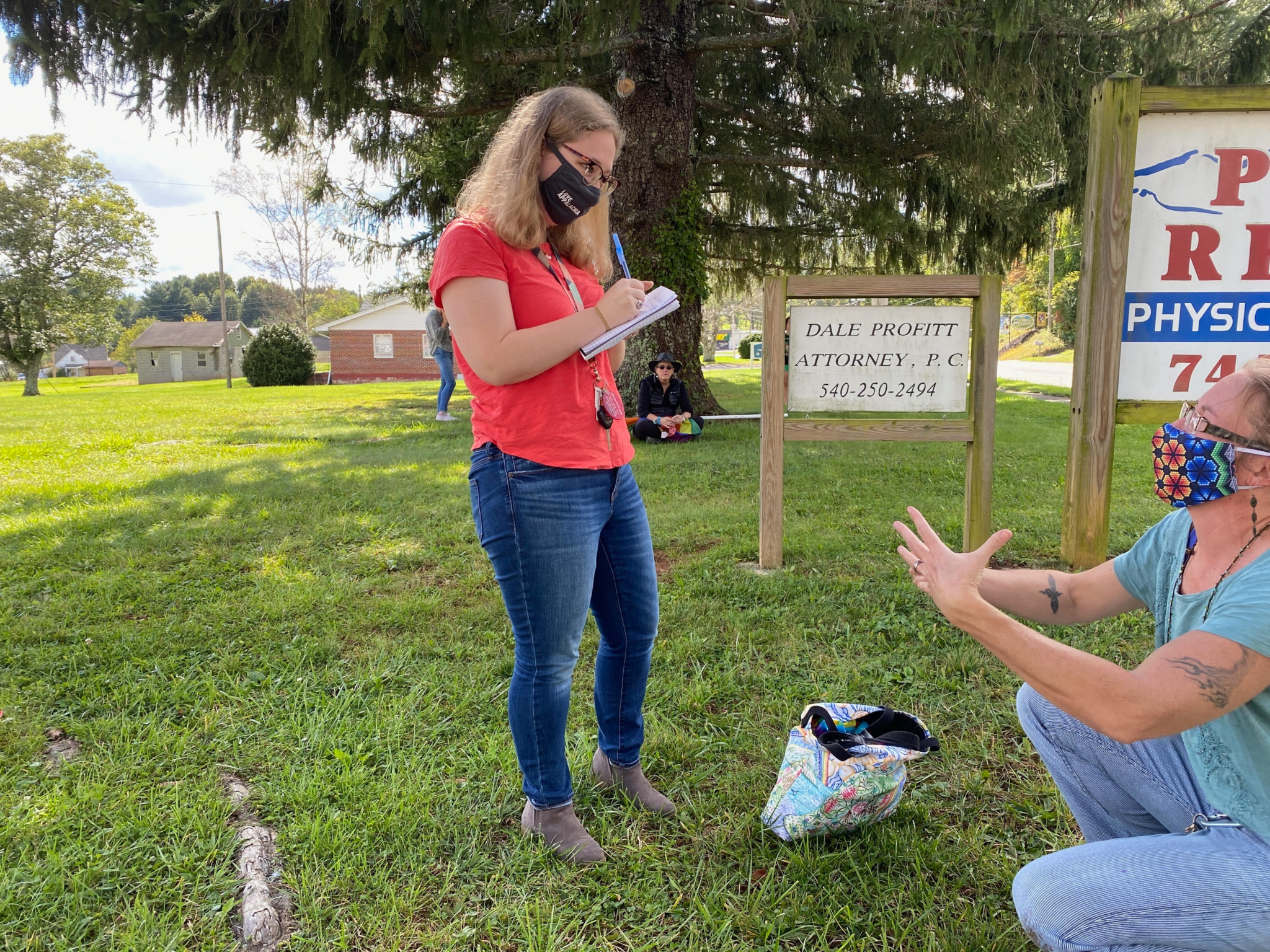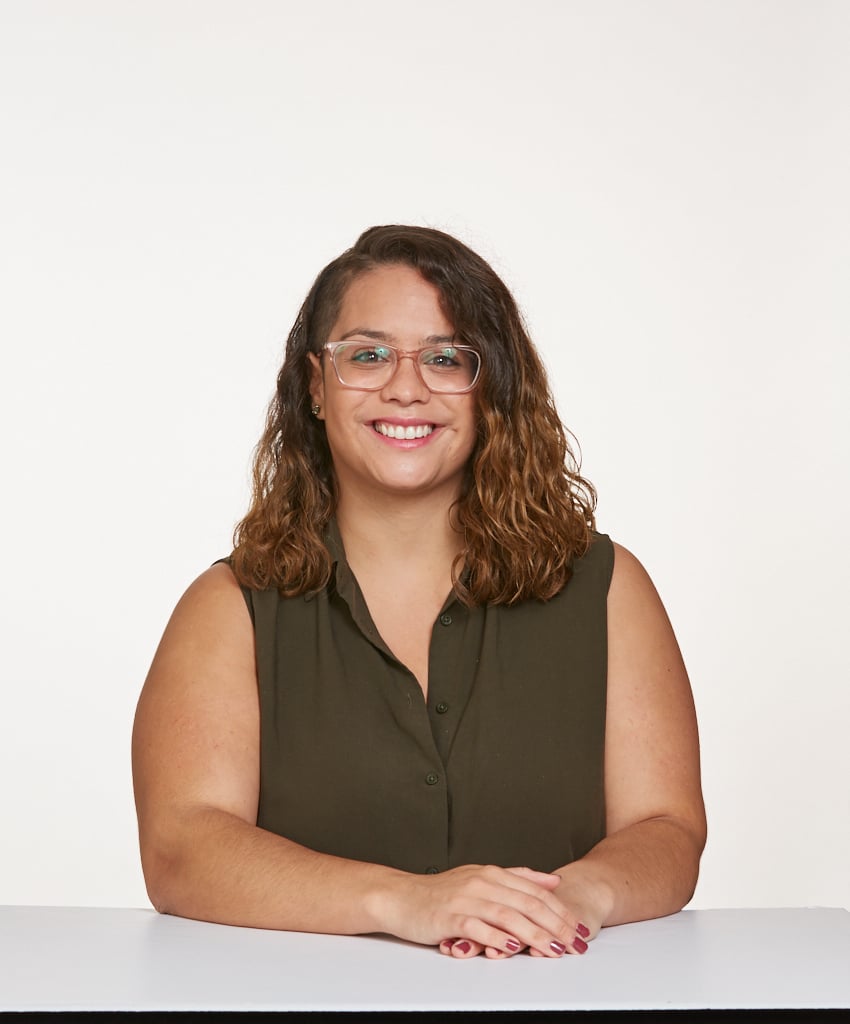Ashley Spinks was busy. As managing editor of the Floyd Press, a newspaper based in rural Floyd County, Virginia, Spinks was working hard to meet her print deadline on Tuesday when she received a conference-call invite from her employer, the media company Lee Enterprises. In short, company management called to inform her that she had been terminated for speaking negatively about the company to the press.
The decision came five days after Virginia public radio station WVTF published a profile on Spinks: “She’s a One-Person Newsroom, But Lee Enterprises Kept Cutting.” In the story, Richmond reporter Mallory Noe-Payne describes how Spinks puts together the newspaper on her own as the Floyd Press’s sole editorial employee, and how she has struggled under Lee Enterprises’s harsh budget cuts. The 26-year-old was making just $36,000 a year to run the entire weekly paper. After Spinks was told she was fired, she decided to tweet about the incident, and her message has since gone viral, leading her to receive Venmo money from strangers and even freelancing reporting opportunities.
An update: I got fired today for doing this interview. Less than 24 hours before the Press goes to print. The paper is not finished, don’t know how it will be. On a personal level: it’s 3 days before my wedding, which my superiors knew. They couldn’t even wait for next week. 1/x https://t.co/CdPeDfbKpN
— Ashley Spinks Dugan (@AshleyinNRV) October 13, 2020
Washingtonian talked to Spinks about what happened, the national attention she’s received, and what comes next.
Let’s go back to the beginning. What was it like running Floyd Press?
It’s a very small outlet. Like other journalism outlets, it’s seen cuts over the years, but what that means in Floyd is basically I was the only full time editorial staffer. I was technically the editor, but really what that meant in practice was spending 80 to 90 percent of my time reporting like a beat reporter, going to local meetings and events, interviewing people for human interest stories and features, taking pictures, and doing all the work that goes along with that. In addition, editing stories from freelancers and press releases and laying out the paper each week.
How did you get involved in the WVTF story?
A reporter for WVTF reached out to me ’cause she followed me on Twitter. I will be honest, this most recent point of conflict with Lee Enterprises is not the first time that I’ve been critical of them. On my professional Twitter account I, along with lots of other journalists who work at Lee-owned outlets, will vent and let out steam especially on particularly bad days. [Reporter Mallory Noe-Payne] was interested in the way that Lee Enterprises’s ownership had impacted my day to day. They pretty drastically reduced my spending on freelance reporting—that was one way for us to supplement our coverage and fill the paper every week because one person cannot do that alone.
What were you hoping would happen when you decided to participate?
Although Floyd Press is not unionized—because there’s nothing to unionize—what I’d hoped would come out of it is similar attention and similar conversations that I had seen generated by my friends who were in unions. The Charlottesville Daily Progress is unionized, the Roanoke Times is unionized. I’ve seen not necessarily fewer cuts happening at those papers, unfortunately, but at least community support and some sort of discourse about, like, do we value this paper, what is this paper bringing to the community, and what are we gonna do to make sure that the paper survives? So I was hoping to add my little tiny part of the story to that conversation and hope that people realize that this is happening everywhere, it’s not just Floyd.
Did you expect any blowback from Lee Enterprises? [Note: A spokesperson for Lee Enterprises did not reply to a request for comment.]
I thought maybe at the most, I would be reprimanded for it. I kind of expected a call from the editor above me to say “don’t do that again.” And, maybe naively, I honestly didn’t think that they would fire me because it would be really hard to replace me. That sounds arrogant but that’s not how I mean it—given the resources at the paper and given what they’re paying, there are very few people willing to do that job. I think maybe it was naive or a little bit arrogant or whatever, but I figured they need me here.
How did you feel after you received the news that you had been fired?
The firing was pretty abrupt. I wasn’t really given the opportunity to ask any questions or vent or sort of express any of my feelings about it directly to management. I was pretty gutted, I was emotional. It just felt so craven. I think everyone who works at a community newspaper kind of feels like they have the Sword of Damocles over their head; we’re all kind of anticipating that, at some point or another, we’ll be laid off, we’ll be fired, our position will be eliminated—because we’ve seen it happen to so many colleagues. It’s not that the firing in and of itself that was so unexpected, but it was just the circumstances of it, and the fact that everyone in management knew that my wedding was coming up. Like, people on Twitter have said, “Well, that’s not a relevant factor, corporations have to do what they have to do,” but it just felt like, to me, there were so many better ways they could’ve handled it and it was really hurtful that they would put that on me and my family just a few days before this big celebration.
It does feel like they escalated the situation really unnecessarily quickly and harshly, where they could’ve just said, “We hear you, we’re sorry you’re frustrated, there’s not much we can do due to financial constraints, please don’t talk to the press again.” They kind of went from zero to the nuclear option. It makes me sad for me but also makes me sad for Floyd County, because I would rather be there wrapping up stories and talking to people and providing journalism. They went from one editorial staffer to no one covering the county, which is a real shame.
What pushed you to tweet about it?
I kind of struggled right off the bat with the decision of whether or not to even share what had happened, like, am I going to tell people on Twitter that I got sacked in the middle of the week because of this interview? Ultimately, it felt like I had already made my principles clear that I think we should be as transparent as possible and I think we should speak truth to power, and at this point, I have nothing left to lose because they already fired me. So I put it out there so that maybe a few people, especially local folks, friends, or allies in the industry, could maybe point me towards one or two opportunities that I could explore. I never expected it to take off the way that it did.
What has it been like seeing this amount of attention?
Since Tuesday I’ve seen such an outpouring of support and I just feel flummoxed and overwhelmed and grateful for it. That’s a gift I’m carrying into my new marriage—having my faith in people and local journalism bolstered and restored, before I have to start the job search. It was kind of this push into a positive direction that helped me recover. It’s been heart-wrenching, on the one hand, because a lot of people who have reached out are fellow reporters who work for corporate-owned newspapers who feel a lot of solidarity and have had similar experiences, and that’s hard to hear.
But at the same time I’ve realized it’s not necessarily about me. In general, people really believe in what I was doing and what other community journalists do on a daily basis and they’re desperate for a way to circumvent the corporate chicanery and really support us. They really do see the value in the work we’re doing. That was just a real gift because there’s part of you that gets very cynical over time, like why am I killing myself—but then you hear from folks and you realize they might not always say it, but they really do value their local newspaper and the people who are putting it out.
What are you planning next?
It’s almost like a moral question, on the one hand, if I’m being honest, there’s a bit of a sense of relief that I’m out of the industry and this feels like an opportunity. The industry—I love it and it felt like a calling, I was passionate about it, but it was also a grind, and it was exhausting and frustrating sometimes. I have an opportunity to start anew. Maybe I can serve the community in a different way besides journalism. Before I got fired, I made a joke that part of me feels like I’d rather be doing something than write about other people doing something. So there’s a little bit of me that feels like journalism is a step removed from the community service and hands-on community building that I really want to be doing.
On the other hand, I deeply believe that Floyd County deserves good, vetted, accurate journalism. I’m not saying I’m the only person who could provide that, but I do think that—because of all the support I’ve received and all the feedback I’ve been given and freelancing opportunities I’ve already been connected with—it feels like I’m really well-positioned to at least in the short- to medium-term keep doing that work to make sure it gets done. I need to pay it forward to my community.
This interview has been edited and condensed for clarity.



















